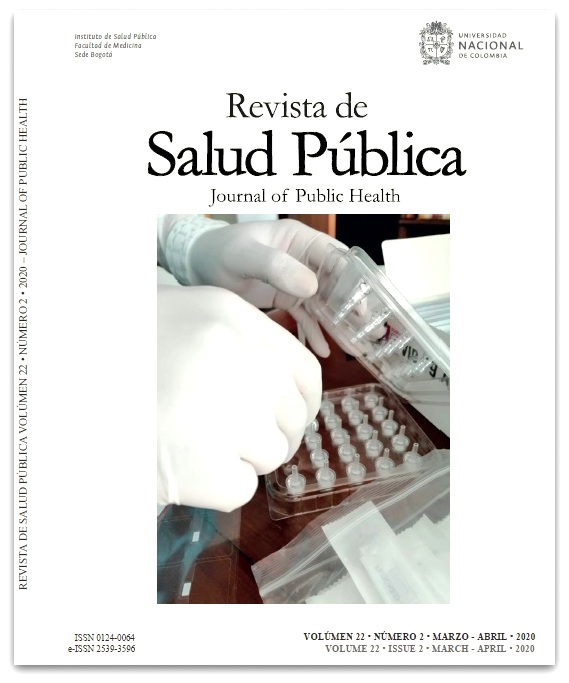Assessment of the implementation of preventive measures by Iraqis people to reduce the spread of COVID-19 pandemic
Valoración de la implementación de medidas preventivas por parte del pueblo iraquí para reducir la propagación de la pandemia de COVID-19
DOI:
https://doi.org/10.15446/rsap.v22n2.86475Palabras clave:
Covid-19, coronavirus, preventive measures, sterilization, implementation (en)COVID-19, coronavirus, medidas preventivas, esterilización, implementación (es)
Descargas
Background and aim The new outbreak “Coronavirus disease 2019 (COVID-19)” happened in china is caused by severe acute respiratory distress syndrome coronavirus 2 (SARS-CoV-2). Consequently, it spreads across the globe and is affecting wellbeing frameworks and the global economy. This pandemic disease places a heavy burden on governments in general, so individuals must adhere to WHO's instructions to limit its spread. The current study was applied to find out the extent of commitment among the Iraqi people to the standards of prevention measures against the coronavirus.
Materials and Methods A cross sectional study was conducted with 1 153 respondents widely in all governorates of Iraq to identify the commitment of the Iraqis to the preventive measures against COVID-19 in Iraq. This study covered the Iraqis in three main regions (Southern, middle, and Northern) for data collection. It was conducted between the 17th and 25th of March 2020, and Iraqis were administered with a structured questionnaire comprising of three domains.
Results The results showed that the majority of the respondents (52%) were female, and most of them (42.3%) were observed between the age group of 31-40 years. About 82% of the respondents were residents of urban areas.
Conclusion This study reveals the excellent implementation of preventive measures by the population. It is observed that the application of prevention standards in the countryside is less than in the city.
Antecedentes y objetivo El nuevo brote “Enfermedad del coronavirus 2019 (COVID-19)” que sufrió en China es el problema del coronavirus 2 del síndrome de dificultad respiratoria aguda grave (SARS-CoV-2). En consecuencia, se extiende por todo el mundo y está afectando los marcos de bienestar y la economía global. Esta enfermedad pandémica supone una gran carga para los gobiernos en general, por lo que las personas deben cumplir con las instrucciones de la OMS para limitar su propagación. El estudio actual se aplicó para determinar el grado de compromiso entre el pueblo iraquí con los parámetros de medidas de prevención contra el coronavirus.
Materiales y Métodos Se realizó un estudio transversal con 1 153 encuestados en todas las provincias de Iraq para identificar el compromiso de los iraquíes con las medidas preventivas contra COVID-19 en Iraq. Este estudio cubrió a los iraquíes en tres regiones principales (sur, medio y norte) para la recopilación de datos. Se realizó entre el 17 y el 25 de marzo de 2020, y los iraquíes fueron administrados con un cuestionario estructurado que consta de tres dominios.
Resultados Los resultados mostraron que la mayoría de los encuestados (52%) eran mujeres, y la mayoría de ellos (42,3%) se observaron entre el grupo de edad de 31-40 años. Alrededor del 82% de los encuestados eran residentes de áreas urbanas.
Conclusión Este estudio revela la excelente implementación de medidas preventivas por parte de la población. Se observa que la aplicación de normas de prevención en el campo es menor que en la ciudad.
Referencias
Richman DD, Whitley RJ, Hayden FG. Clinical virology [Internet]. 4th ed. Washington: American Society for Microbiology; 2017 [Cited 2020 April 18]. Available from: https://bit.ly/2Zp2DBS.
De-Groot RJ, Baker SC, Baric RS, Brown CS, Drosten C, Enjuanes L, et al. Middle East Respiratory Syndrome Coronavirus (MERS-CoV): Announcement of the Coronavirus Study Group. J Virol. 2013 Jul 15 [Cited 2020 April 21];87(14):7790–92. Available from: https://bit.ly/2ylEm4q. DOI:10.1128/JVI.01244-13.
Zaki AM, Van-Boheemen S, Bestebroer TM, Osterhaus AD, Fouchier RA. Isolation of a novel coronavirus from a man with pneumonia in Saudi Arabia. N Engl J Med. 2012 Nov 8 [Cited 2020 April 21]; 367(19):1814–20. Available from: https://bit.ly/2Zva0rp. DOI:10.1056/NEJMoa1211721.
Huang C, Wang Y, Li X, Ren L, Zhao J, Hu Y, et al. Clinical features of patients infected with 2019 novel coronavirus in Wuhan, China. Lancet. 2020 Feb 15 [Cited 2020 April 21]; 395(10223):497–506. Available from: https://bit.ly/2TsKq2l. DOI:10.1016/S0140-6736(20)30183-5.
Dong Y, Mo X, Hu Y, Qi X, Jiang F, Jiang Z, et al. Epidemiological Characteristics of 2143 Pediatric Patients with 2019 Coronavirus Disease in China. Pediatr. 2020 Mar [Cited 2020 April 21]. Forthcoming 2021. Available from: https://bit.ly/2WTMOBB.
Kampf G, Todt D, Pfaender S, Steinmann E. Persistence of coronaviruses on inanimate surfaces and their inactivation with biocidal agents. J Hosp Infect. 2020 Mar [Cited 2020 April 21]; 104(3):246–51. Available from: https://bit.ly/36pJBgi. DOI:10.1016/j.jhin.2020.01.022.
World Health Organization. Coronavirus disease 2019 (COVID-19) Situation Report – 67 [Internet]. [place unknown]: World Health Organization; 2020 Mar [Cited 2020 April 21]. Available from: https://bit.ly/2ARzhSs.
Siddharta A, Pfaender S, Vielle N, Dijkman R, Friesland M, Becker B, et al. Virucidal Activity of World Health Organization – Recommended Formulations Against Enveloped Viruses, Including Zika, Ebola, and Emerging Coronaviruses. J Infect Dis. 2017 Mar 15 [Cited 2020 April 21]; 215(6):902-6. Available from: https://bit.ly/3gcuOdm. DOI:doi.org/10.1093/infdis/jix046.
World Health Organization (WHO). Water, sanitation, hygiene and waste management for the COVID-19 virus [Internet]. [Place unknown]: World Health Organization; 2020 Apr 23 [Cited 2020 April 24]. Available from: https://bit.ly/2zXledx.
Rahman MD. Coronavirus infection prevention and control practices in the care home setting in 2020. Research Gate. 2020 Mar [Cited 2020 April 21]. Available from: https://bit.ly/2TsTnIZ.
Cómo citar
APA
ACM
ACS
ABNT
Chicago
Harvard
IEEE
MLA
Turabian
Vancouver
Descargar cita
Licencia
Derechos de autor 2020 Revista de Salud Pública

Esta obra está bajo una licencia internacional Creative Commons Atribución 4.0.
Esta revista provee acceso libre inmediato a su contenido bajo el principio de que hacer disponible gratuitamente investigación al publico apoya a un mayor intercambio de conocimiento global.
Todos los contenidos de esta revista, excepto dónde está identificado, están publicados bajo una Licencia Creative Commons Atribución 4.0.




















